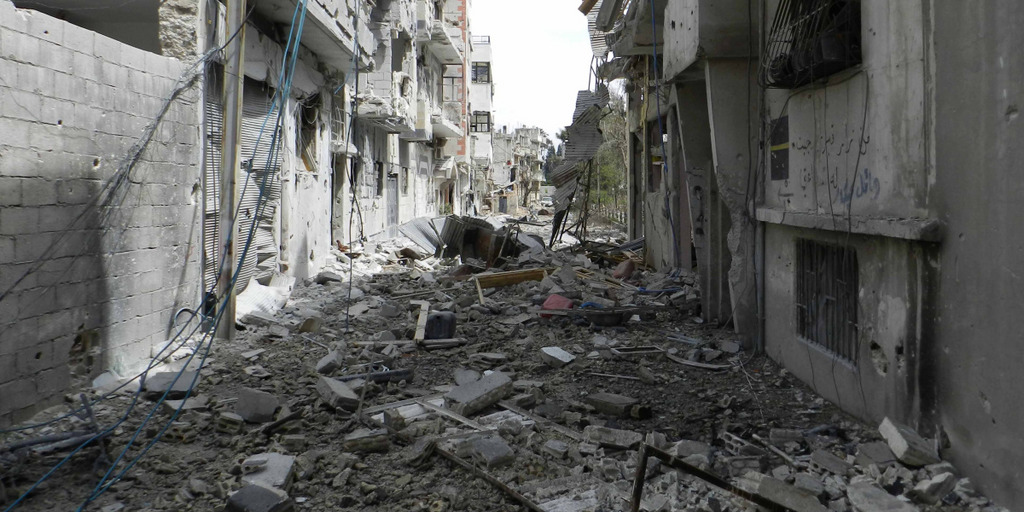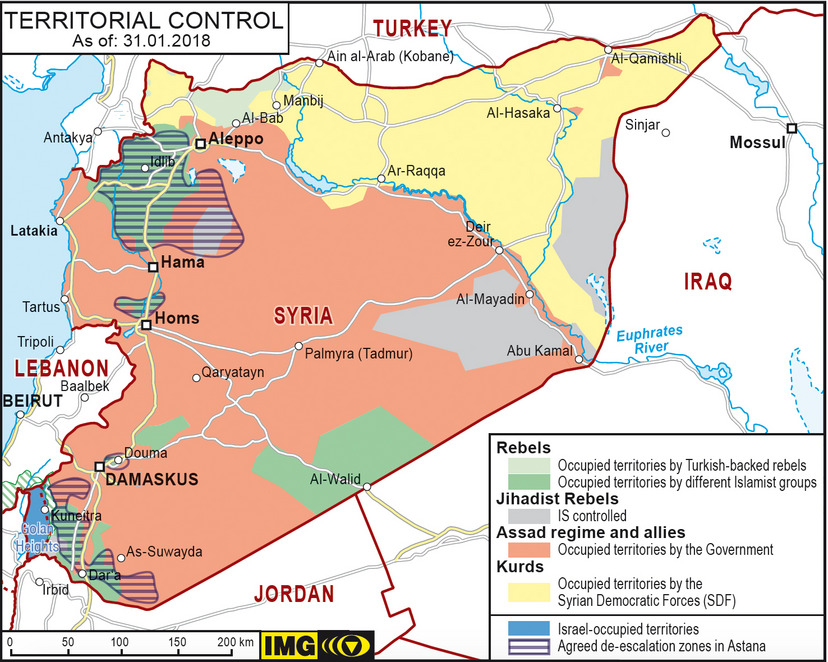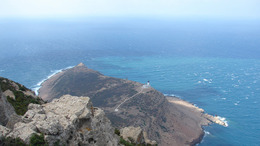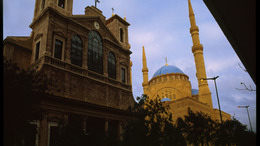Expulsion or resettlement of religious and ethnic segments of the population is part of the war strategy of the regime, of Islamist militias, of Kurdish militias, and of Turkish and Iranian forces. Hundreds of thousands of Syrians have been killed, injured or have disappeared. There is proof that the Assad Regime and the "Islamic State" have made use of chemical weapons. Further multifaceted war crimes have sown hatred. The World Bank estimates the cost of reconstruction to be nearly 200 billion euros. Although the regime has almost won the civil war, an end to the war is not in sight. Power and influence in Syria belong to those who use military force. Fighting is also taking place in the agreed de-escalation zones.

By Bo yaser (Own work) / Wikimedia Commons - CC-BY-SA 3.0, https://creativecommons.org/licenses/by-sa/3.0/deed.en
Seven Years of Syrian Civil War
In March the conflict entered its eighth year of war. It began in 2011 with social and political protests, escalated into a civil war and developed into a proxy war of various actors. Among them, crucial are Iran, Russia, Turkey and increasingly Israel and the United States. Half of the Syrian population have either fled abroad or been displaced within the country.
Local Warring Parties
The Assad Regime
The Assad regime is a dictatorship supported by the military and security apparatus and based on numerous Alawite, Christian, Shia and Sunni clans and networks. Thanks to the military and financial support of the Iranian Revolutionary Guards, Hezbollah and Russia, the regime has almost won the civil war. The Assad leadership seeks international recognition and sovereignty over the entire territory. Despite pressure from the Kremlin, the Assad clan does not wish to share its power with any opposition group. The regime is using the humanitarian aid of the United Nations to provide for its clientele in particular. It has to share power and resources with militia chiefs from its own part of the political spectrum. The Alawite community does not unanimously support the Assad clan. The regime has succeeded in eliminating the secular opposition and contributing to the radicalisation of Islamist opposition groups.
Opposition, Rebels and Jihadists
In the absence of Western support, the secular opposition has lost influence. Instead, Turkey, Qatar and Saudi Arabia have supported different Islamist groups. Numerous local rebel militias have arisen and are also fighting each other. Consequently, the Free Syrian Army (FSA) has largely lost its influence and secular character. Some jihadist rebel groups (offshoots of al-Qaeda) have been declared terrorist groups by the United Nations. The extremely brutal warfare of the Assad regime against its people has contributed to the radicalisation and Islamisation of rebel groups. The rebels still dominate a few parts of the country in the north and south of Syria. The political opposition, along with the SNC (Syrian Negotiation Commission), is participating in the negotiation process of the United Nations in Geneva (the Geneva Process). Russia meanwhile has set up a parallel opposition structure, the Sochi Process, which largely comprises supporters of the Assad regime. Turkey is blocking the participation of Syrian-Kurdish politicians.
The "Islamic State"
After losing its territory in western Iraq, "Islamic State (IS)" has also lost almost all of its territory in eastern Syria. The leader of the IS, al-Baghdadi, is said to be in hiding in Syria. Fighters of the IS represent a threat of international terrorism. Even if they have lost their geographical base, the ideology of the IS remains dangerous. The Kurdish YPG militia and Peshmerga, Free Syrian Army, Shiite militias led by the Iranian Revolutionary Guards and, finally, some Assad militias have made a decisive contribution to the military success over the IS in Syria on the ground.
The Kurds
The Syrian Kurds make up 15 percent of the population. Some of them prefer a life in a secular Syrian nation-state. The greater majority of people feel connected to their compatriots in southern Turkey and northern Iraq, wholeheartedly desire their own state, but politically are seeking the greatest possible autonomy. In the "Rojava" area in northeastern Syria, they have won their independence. The YPG militia successfully fought the IS on the ground, and thus occupy the area of Afrin. The Turkish army has marched in to expel the YPG, which classifies Ankara as a supporter of the PKK.
Regional Powers
Turkey
In 2011, President Erdogan wanted to overthrow Syrian ruler Assad. Since 2015, Turkey's Syria policy has been entirely focused on preventing – including militarily – Kurdish statehood. Due to the intervention in the Kurdish enclave of Afrin, the relationship with NATO partner the United States is strained. Ankara has built an 800 km long fence along the border with Syria and wants to create a 30 km "buffer zone". At the same time, Erdogan has declared himself an advocate of the Syrian Sunnis. Around three million of them are refugees in Turkey. Ankara is planning to settle many of them in the Syrian Kurdish area and to promote them as Turkish citizens vis-à-vis Erdogan supporters. Ankara is supplying the Syrian province of Idlib, the last contiguous rebel area, ruled by various Islamist/jihadist militias.
Iran
Tehran has mobilized enormous resources (deployment of 10,000 Afghan and Iraqi mercenaries and 9,000 Lebanese Hezbollah fighters, training and logistical support from 3,000 Iranian Revolutionary Guards, and providing military and financial resources) to militarily support the Assad regime in the civil war. Iranian military have acquired significant property in Syria. They propagate their support for Shiism in Syria. Geopolitically, Iran has expanded its political and military power in Iraq, Syria and Lebanon.
Israel
Israel is closely observing the military and political growth in power of the Iranian Revolutionary Guards in Syria and Hezbollah in southern Lebanon, and with great concern. Israel is using its military air superiority to bomb their positions in Syria. With the shooting down of an Iranian drone over Israeli territory and an Israeli fighter plane over Syria, the danger of direct Iranian-Israeli confrontation is increasing. In local border traffic in the Golan Heights, Israel is providing humanitarian aid to Syrians.
Qatar
Doha has reduced its support for Islamist militias in Syria after the fall of eastern Aleppo and eastern Ghouta considerably. Qatar is leaving the field of Islamist opposition in Syria to Turkey.
Saudi Arabia
Riyadh has also withdrawn from financing Islamist militias in Syria and only organised meetings of the Syrian-Sunni opposition in 2015-16. Riyadh is leaving the field of Islamist opposition in Syria to Ankara. The United States is urging Saudi Arabia to finance reconstruction in the Syrian areas east of the Euphrates that have been liberated from the IS.
Other Regional Actors
Jordan
There are 700,000 Syrian refugees registered in this small kingdom. The international community is providing effective help at all levels. From Jordan, the West is conducting its airstrikes against the last positions of the "Islamic State".
Lebanon and Hezbollah
The land of the cedar is overburdened by the Syrian refugee crisis, despite extensive international assistance. More than one million Syrian refugees live for the most part in tent camps in the east of the small country. The fragmented political elite want to keep the country out of civil war. This is difficult because Hezbollah, a key political force in Lebanon, is fighting in Syria on the side of the Assad regime.
Iraq
Organised by the Iranian Revolutionary Guards, several thousand Shiite mercenaries from Iraq are fighting on the side of the Assad militias. With the help of the international coalition and Kurdish Peshmerga, Shiite militia and the Iraqi army have defeated and/or expelled the IS from Iraq.
Egypt and the Arab League
In 2013 President General al-Sisi ended the political support of his predecessor (Muslim Brotherhood President Morsi) for the Syrian-Islamist opposition. The leadership in Cairo sympathizes with the Assad regime – although Damascus is excluded from the Arab League.
International Dimension
United Nations
If Moscow and Washington do not pull together, the United Nations is politically blocked. Since the distribution of humanitarian aid in Syria is organized through the regime, the United Nations is dependent on the goodwill of the Assad regime. Thus, enough relief supplies are available for besieged towns or villages, but in many cases the regime does not allow the convoys through to East Ghouta. As mediators, the United Nations are required, but weak. Two UN special envoys have already thrown in the towel. The United Nations’ political process (the Geneva Process) is competing with the Kremlin's mediation initiative (the Sochi Process).
United States
Washington is involved through air strikes, special forces on the ground (around 2,500 in number), and arms supplies to the Kurdish YPG militia in Syria to fight the IS. Thus, Syrian territory east to the Euphrates has been conquered by the "IS". Israel, Jordan and Saudi Arabia are urging the US to stay with their soldiers, in order to prevent a continuous airlift from Iran to the Mediterranean. In fact, however, US president Trump does not want to be involved in the civil war and remove its soldiers - even after the missile attack on Assad's facilities for chemical weapons as of 13 April 2018.
Russia
Moscow wants to act as, and be recognised as, a power to maintain order in the Middle East. Putin is filling the vacuum that Obama created. The Kremlin’s military intervention in Syria from September 2015 has contributed significantly to the continued victory of the Assad regime. Moscow controls Syrian airspace, and maintains a base and a military port with around 7,000 soldiers. Through its veto in the UN Security Council and its own negotiation initiatives (the Sochi Process), Russia dominates the political process and limits the UN's ability to act (through the Geneva Process). Moscow is aiming for centralized secular government capacity in Syria, and is thus in opposition to Iran's Syrian strategy.
European Union
Over 600,000 Syrians have fled to the EU. Brussels is the primary source of funding (10.6 billion euros since 2011) of humanitarian aid in Syria and the neighbouring countries. Politically, the EU plays a subordinate role as it is not a military actor. Paris and London, acting with their aerial attakcs of 13 April 2018 as veto powers of the UN Security Council, are an exception in this respect. Monetary aid of the EU is desired, but political concessions can hardly be bought. While Germany closed its embassy in Damascus in 2011, the Czech Republic continues to keep diplomatic representation there; Prague is being criticized for issuing visas to controversial Assad henchmen.
Where Germany Is Involved
500,000 Syrians (12 percent of all Syrians who have fled the country) have applied for asylum in Germany. Germany is the largest donor – directly, and via the EU and the United Nations – for the relief of the Syrian refugee disaster in Syria and its neighbouring countries. Berlin is a key location for secular Syrian oppositionists. The Bundeswehr provides military support to the international coalition in the fight against the Islamic State through training missions in Iraq, a Tornado reconnaissance jet out of Jordan and arms deliveries to Kurdish Peshmerga in northern Iraq. Some 100 German citizens have joined the IS as fighters. The Turkish-Kurdish conflict is also reflected in demonstrations by Kurds and Turks in Germany.



![[Translate to English:] Blick auf das jordanische Flüchtlingslager Zaatari. Zu sehen sind hunderte befestigte Unterkunfszelte, die bis zum Horizont reichen. Im Vordergrund stehen zwei Kinder mit Wasserkanistern, die der Kamera den Rücken zugedreht haben](/fileadmin/files/_processed_/8/c/csm_18859157069664135582_7a67ecbdf8_o_5eaf03248c.jpg)



